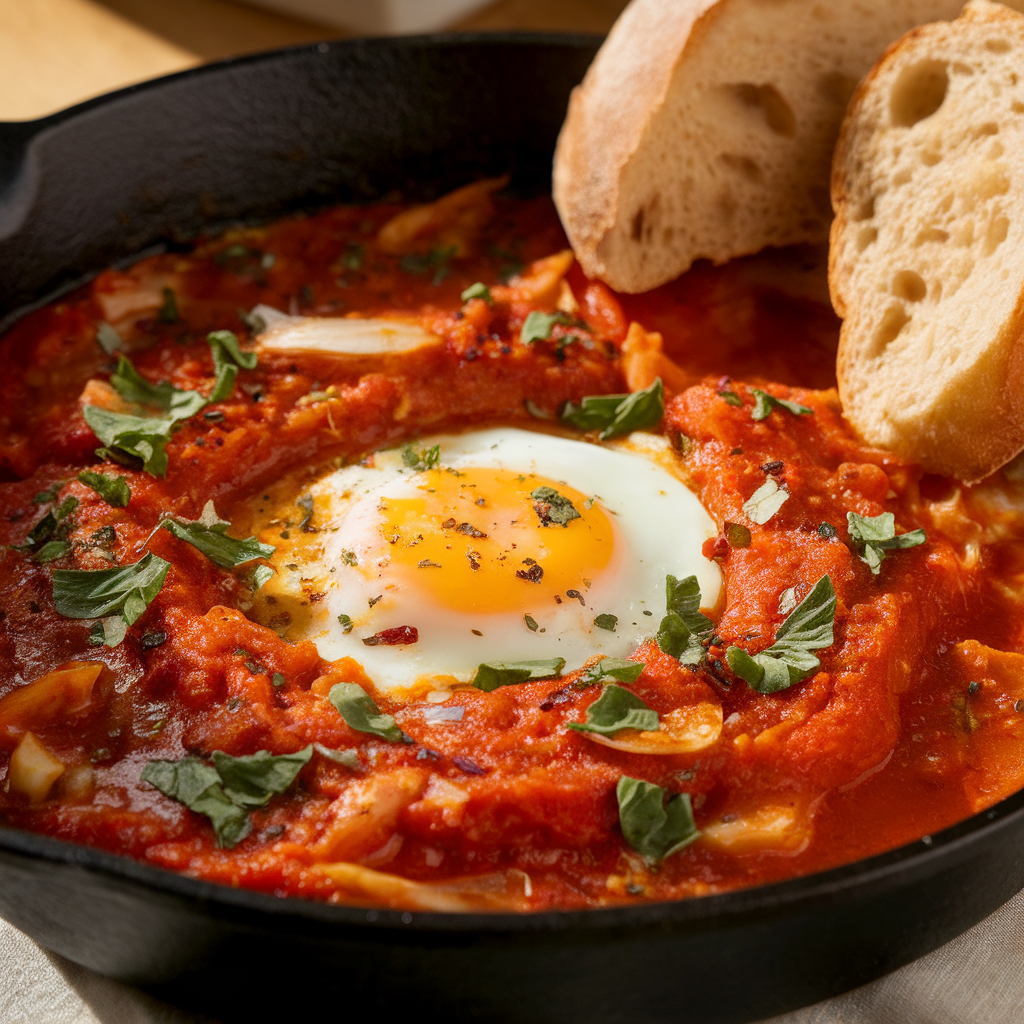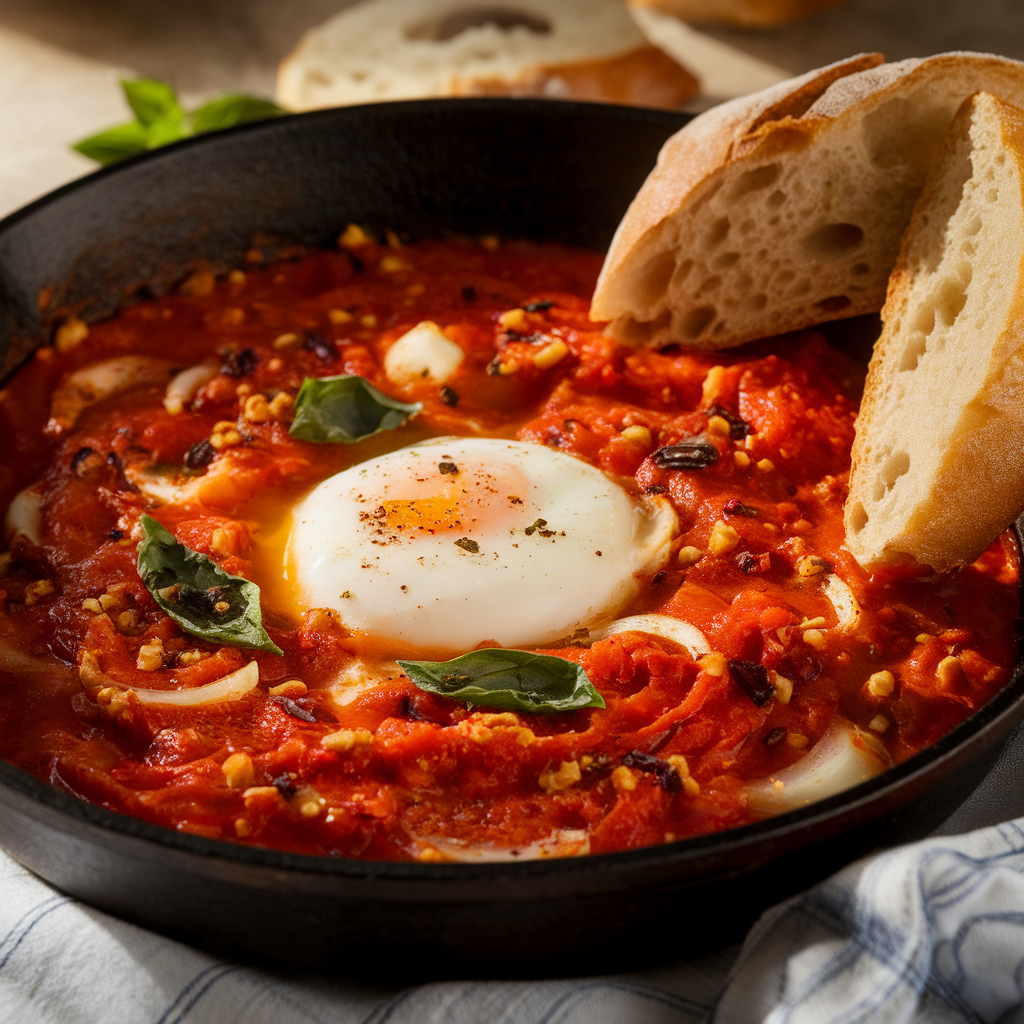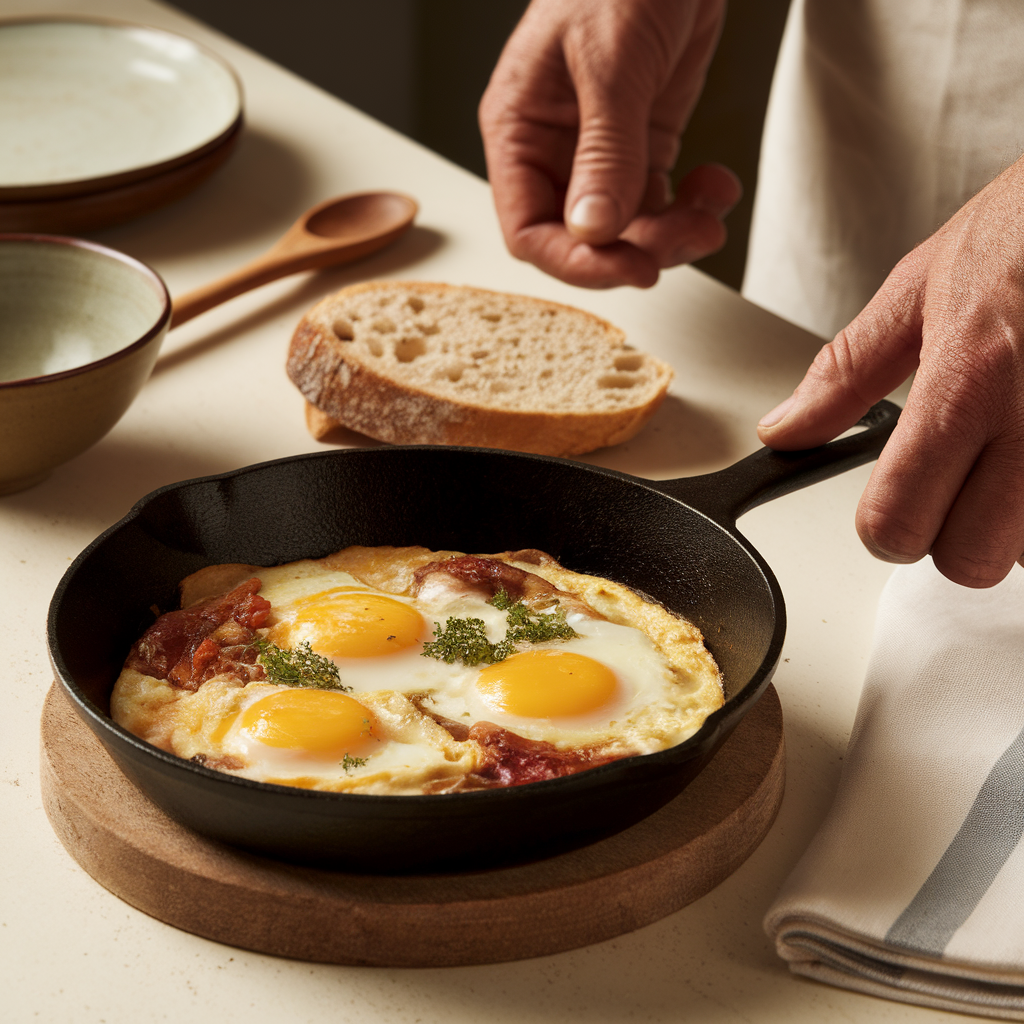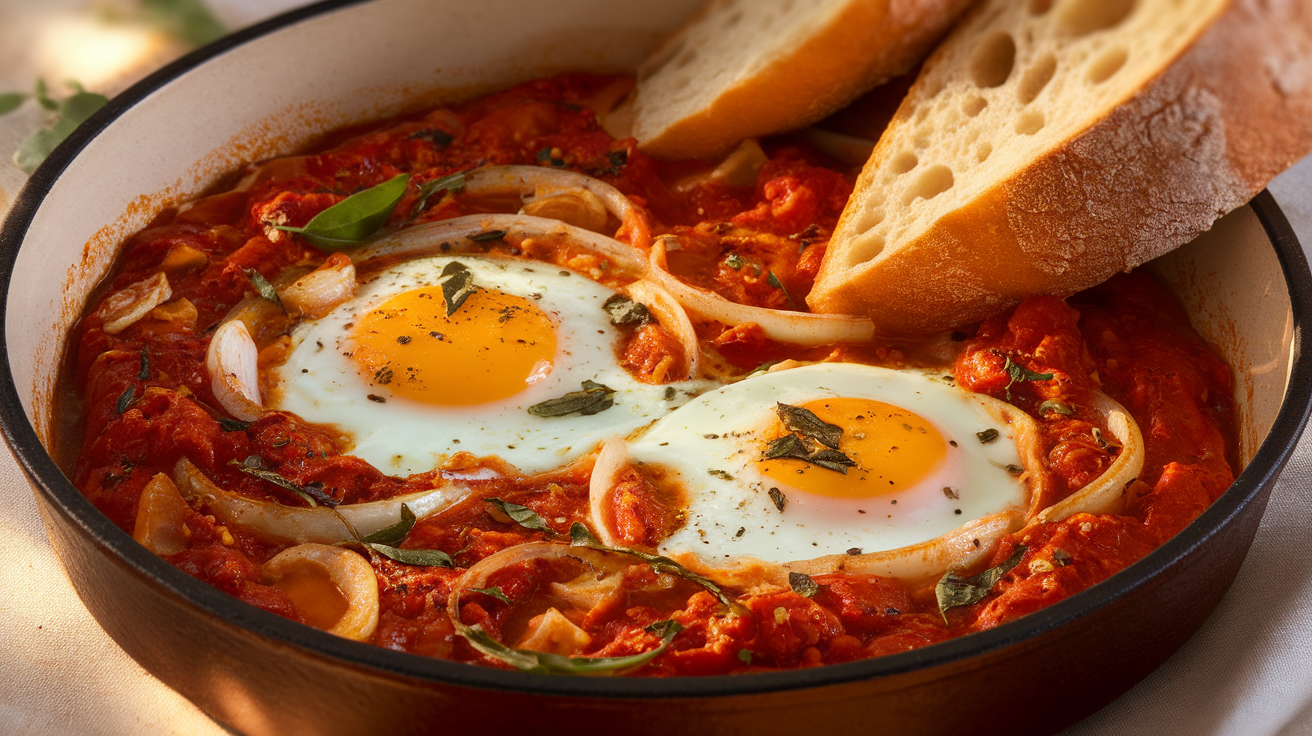Few dishes strike a balance between rustic simplicity and rich flavor like Eggs in Purgatory. Known in Italian as Uova in Purgatorio, this traditional Southern Italian dish of poached eggs in tomato sauce is beloved for its fiery flair, nourishing comfort, and effortless preparation. Whether you’re craving a New Orleans-style breakfast, looking for wholesome egg recipes for dinner, or simply exploring the world of poached egg dishes, this is a must-have for your cooking repertoire.
This dish isn’t just food—it’s folklore. With eggs nestled like souls in a bubbling red sea of tomato, Eggs in Purgatory conjures up images of classic Italian kitchens, where a handful of pantry staples can feed the soul. In today’s fast-paced world, the dish offers something rare: warmth, depth, and tradition in under 30 minutes.
🍅 What Is Eggs in Purgatory?
Eggs in Purgatory is a Southern Italian dish where eggs are poached directly in a simmering, spicy tomato sauce made with garlic and olive oil. The eggs cook until their whites set and yolks stay runny, creating a luscious texture. The name reflects both the dish’s fiery heat and visual drama: the eggs float like “souls in purgatory” amid the bubbling red sauce.
This meal has humble roots in cucina povera, or “peasant cooking,” which emphasizes making the most of basic ingredients. It’s similar to the Middle Eastern dish Shakshuka but usually spicier and simpler, without added vegetables like bell peppers or onions.
🇮🇹 Historical Roots: From Italy to the World
The dish originates in Southern Italy—particularly Naples and Calabria—where tomato-rich sauces are a kitchen staple. Over generations, it spread across the Mediterranean and eventually made its way into global cuisine.
In New Orleans breakfast recipes, the Creole version often includes additions like spicy andouille sausage or bell peppers. In Spanish cuisine, a similar idea manifests in Huevos Flamenca, and in Middle Eastern dishes, Shakshuka reigns with cumin and harissa.
Across all variations, the essence remains: eggs gently cooked in a rich, flavorful sauce.
🍳 Essential Ingredients for Easy Eggs in Purgatory
A truly easy Eggs in Purgatory recipe sticks to pantry essentials while leaving room for creativity. Here’s what you’ll need:
Basic Ingredients:
- 2 tbsp olive oil
- 3–4 garlic cloves, thinly sliced or minced
- 1 tsp red pepper flakes (or less if you prefer mild)
- 1 (14 oz) can crushed tomatoes or San Marzano whole tomatoes
- Salt & black pepper, to taste
- 4 large eggs, room temperature
- Fresh basil or parsley, chopped
- Parmesan cheese (optional but recommended)
- Toasted sourdough, crusty bread, or polenta, for serving
💡 Tip: Use high-quality olive oil and real San Marzano tomatoes for the richest flavor.

🔪 Step-by-Step Instructions
Here’s how to make this classic poached eggs sauce dish from start to finish:
🧄 1. Infuse the Oil
In a wide skillet or sauté pan, heat the olive oil over medium heat. Add garlic and sauté until golden and fragrant, about 1–2 minutes. Stir in red pepper flakes and cook another 30 seconds.
🍅 2. Simmer the Sauce
Add your canned tomatoes (crushed or hand-crushed whole tomatoes). Season with salt and pepper. Let it simmer for 10–15 minutes until thickened slightly. Taste and adjust seasoning.
🍳 3. Poach the Eggs
With a spoon, make small wells in the sauce. Crack the eggs into each well. Reduce heat to low, cover the skillet, and simmer gently for 5–7 minutes until whites are set but yolks are still runny.
🔥 Want soft but fully cooked yolks? Cook for 1–2 minutes longer, or baste the eggs with hot sauce.
🌿 4. Garnish and Serve
Remove from heat and top with chopped basil or parsley. Add shaved or grated Parmesan for extra depth. Serve hot with bread or polenta.
🍽️ Serving Suggestions: From Breakfast to Dinner
What makes this dish so appealing is how versatile it is. You can dress it up for brunch, or serve it with bold twists for dinner.
🥄 Eggs and Polenta Breakfast
Want to level up your mornings? Spoon the eggs and sauce over soft, buttery polenta. It’s a comforting and hearty way to start the day.
🍷 Red Wine Poached Egg Variation
Deglaze the skillet with a splash of red wine before adding the tomatoes. This adds richness and depth, turning the dish into a satisfying dinner. It’s the ultimate elegant twist on egg recipes for dinner.
🥖 Crusty Bread or Garlic Toast
Nothing beats mopping up the saucy goodness with toasted sourdough or homemade focaccia. Try garlic butter toast for extra flavor.
🥘 Make It a Bowl
Serve the eggs and sauce over a base of cooked quinoa, farro, or even risotto for a modern, protein-packed meal.

🧑🍳 Flavor Variations & Add-Ins
While the classic is perfect, here are some optional upgrades:
🧅 Add Veggies
- Sauté onions, spinach, or bell peppers with the garlic.
- Stir in kale or zucchini to boost the veggie content.
🧀 Add Cheese
- Crumble in feta, goat cheese, or shredded mozzarella for creaminess.
- Or try Pecorino Romano for a salty bite.
🧂 Seasoning Upgrades
- Add a pinch of oregano or thyme.
- A splash of balsamic vinegar adds tang.
- Use smoked paprika for depth and warmth.
🌍 Global Twists on Eggs in Purgatory
This humble Italian dish adapts beautifully across different cuisines:
🇺🇸 New Orleans Style
Sauté bell pepper, onion, and celery (the Creole “holy trinity”). Add Cajun seasoning, hot sauce, and smoked sausage. Serve over grits.
🇲🇦 Moroccan Inspired
Add cumin, harissa, and a pinch of cinnamon. Top with olives, preserved lemon, and fresh cilantro.
🇪🇸 Spanish Fusion
Add cooked chorizo, paprika, and roasted potatoes. Top with Manchego cheese and chopped parsley.
🇬🇷 Mediterranean
Include spinach and feta, and use oregano and lemon zest to brighten the dish.
🧊 Make-Ahead, Storage & Leftovers
🕒 Make Ahead
- Make the sauce up to 4 days in advance and refrigerate.
- When ready to serve, reheat and poach the eggs fresh.
🧊 Storing Leftovers
- Store cooled leftovers in an airtight container.
- Best within 1–2 days, but sauce can freeze up to 3 months.
🔥 Reheating
- Gently reheat in a skillet with a splash of water.
- The yolks will firm up slightly, but the flavor remains intact.
🥚 Perfecting the Poach: Tips for Success
- Fresh eggs poach best. The whites hold together better and look neater.
- Simmer, don’t boil. Gentle heat prevents overcooking and keeps yolks runny.
- Cover the pan. This ensures even top-down heat to set the whites.
- Use a wide pan. More surface area = more eggs = better presentation.
- Serve immediately. For best texture and temperature, eat right away.
🧠 Nutritional Benefits
Eggs in Purgatory isn’t just delicious—it’s nourishing:
- High in protein from eggs.
- Rich in antioxidants from tomatoes (lycopene, vitamin C).
- Low in carbs (especially if served without bread).
- Good for brain and eye health, thanks to eggs’ choline and lutein.
It fits into Mediterranean, keto (with adjustments), and vegetarian diets. For a gluten-free version, serve over polenta or gluten-free bread.

📖 Eggs in Purgatory vs. Shakshuka
While often compared, the two dishes differ:
| Feature | Eggs in Purgatory | Shakshuka |
|---|---|---|
| Origin | Italy | North Africa / Middle East |
| Base | Garlic + Tomato | Onion, Peppers, Tomato |
| Spices | Red pepper flakes | Cumin, paprika, harissa |
| Add-ins | Minimal | Often with veggies, herbs |
| Cheese | Optional Parmesan | Often includes feta |
| Bread | Rustic Italian | Pita or crusty bread |
Both are delicious—but if you prefer a simpler, more tomato-centric dish, go for Eggs in Purgatory.
💬 Frequently Asked Questions (FAQs)
Q: Can I use fresh tomatoes instead of canned?
Yes! Use 4–5 ripe plum tomatoes. Blanch, peel, and chop them before simmering for 15–20 minutes.
Q: Can I make this dish vegan?
Yes, skip the eggs and serve the spicy tomato sauce with tofu or chickpeas over polenta or toast.
Q: Can I bake the eggs instead of poaching?
Yes. Use an ovenproof skillet, crack eggs into the sauce, and bake at 375°F (190°C) for 8–10 minutes.
Q: How do I make it keto-friendly?
Skip bread, and serve with sautéed greens, roasted cauliflower, or keto polenta.
🎯 Final Thoughts
From its poached eggs in tomato sauce foundation to endless regional and modern adaptations, Eggs in Purgatory is the kind of dish that satisfies on every level—taste, nourishment, and story. Whether you’re exploring new egg recipes for dinner, recreating a cozy Italian scrambled eggs brunch, or spicing things up with red wine poached egg elegance, this dish is endlessly versatile and deeply satisfying.
It’s fast enough for a weeknight, fancy enough for guests, and soulful enough to become your new favorite comfort food.
So the next time you’re staring at a can of tomatoes and a few eggs—don’t settle. Make Eggs in Purgatory and experience the fiery charm of Italian home cooking.


